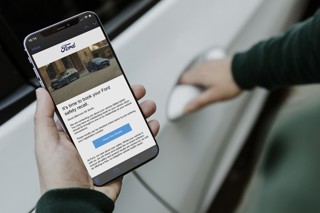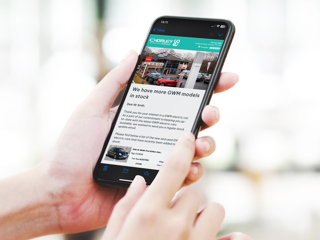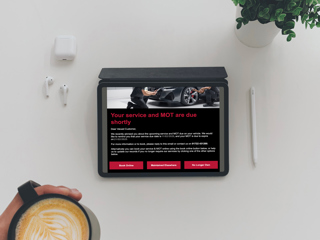Only one in 10 dealers are using Facebook advertising, despite it being the only way they can reach a large proportion of its users that don’t like ‘brand’ pages.
Not only are dealers missing out on a large proportion of the relevant Facebook audience, they are also missing the opportunity to make their social marketing more effective, according to new research by electronic customer relationship management systems provider Marketing Delivery.
It says 40% of Facebook users don't 'like' brand pages.
Modern targeting techniques for Facebook advertising also allow dealers to profile and engage directly with all relevant users according to their location and what they currently drive, as well as by their search preferences when they look for a new car, down to vehicle marque and model.
“The average age of Facebook users on pages that Marketing Delivery oversees is 38, which dispels the myth that Facebook is ‘only for teenagers’,” said Jeremy Evans, managing director of Marketing Delivery.
“While younger people often ‘like’ a car dealer’s page, it is the people with the disposable income and purchase ability that are interacting with content and are best reached through social advertising.”
But with established social advertising tools like Google AdWords, competition for car buyers’ attention online is tougher and more expensive than ever.
By contrast, data-driven Facebook advertising is available with an average cost-per-click of just £0.20, which is around 80% cheaper than adwords for car dealers.
Analysing the two-month period of September to October 2016, Marketing Delivery clients using Facebook advertising alongside other digital and social advertising tools found that up to 60% of their total new vehicle display page referrals came from the Facebook advertising activity, beating the likes of Google and Auto Trader.
The analysis coincides with the launch of Marketing Delivery’s new ‘social media package’, which combines all of the company’s data-driven social offerings, including social media advertising, the SocialStock app, social CSI and social media community management, into one customisable programme.
The science behind Facebook advertising
When researching a dealership, Facebook users often access ratings and reviews on the platform – and that rating now shows up on a Google results page.
If the user visits the dealer’s website, a ‘Facebook pixel’ tracking code can monitor their engagement with different pages.
Targeted marketing can harness Google Analytics data to see which users made enquiries or requested a call back, and dealers can use relevant Facebook adverts to re-engage where needed.
At the highest level, Marketing Delivery can use the data from the Facebook pixel to target existing customers as well as a ‘lookalike audience’.
“This is where Facebook analyses the characteristics of a large enough sample audience to create an expanded audience with similar demographics, interests and accounts,” said Evans.
“A smaller audience can be filtered according to their interaction with the dealer’s website.
“For example, targeting only those people who clicked on used cars, and serving them with relevant advertising tied to the dealer’s pre-owned stock.
“A database of contacts can be taken from a dealer’s DMS and uploaded to Facebook.
“If the set of contacts is large enough then it can match known customers to existing profiles on Facebook, thereby giving dealers a new way to communicate with current and potential customers.
Marketing Delivery’s ‘micro audience’ targeting takes this one step further, by using additional data from its eCRM system’s customer records to narrow down to a group of ‘live’ used car prospects.
They can then be served with data-driven marketing about particular vehicles in stock. Such an advert may have a very small audience, but it will have remarkably high relevance.
“Facebook provides one of the best platforms for customer engagement at a local level, and advertising on it can allow dealers to target the right people with the right marketing messages at the right time.
"This type of targeting relies on accurate, high-quality data to be a success; so using a large, generic database of contacts will yield poor results.
“It’s still incredibly important for car dealers to have an active community presence on social media, and to post exceptional content that engages customers and followers; but if they are not using targeting advertising on Facebook as well, then they are missing a trick.”





















Login to comment
Comments
No comments have been made yet.